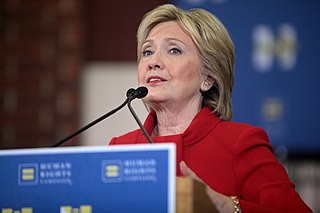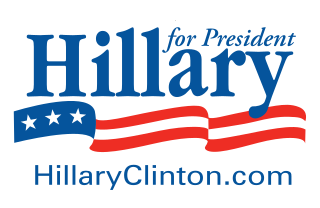Related Research Articles

The 2008 United States presidential election was the 56th quadrennial presidential election, held on Tuesday, November 4, 2008. The Democratic ticket of Barack Obama, the junior senator from Illinois, and Joe Biden, the senior senator from Delaware, defeated the Republican ticket of John McCain, the senior senator from Arizona, and Sarah Palin, the governor of Alaska. Obama became the first African American to be elected to the presidency, as well as being only the third sitting United States senator elected president, joining Warren G. Harding and John F. Kennedy. Meanwhile, this was only the second successful all-senator ticket since the 1960 election and is the only election where both major party nominees were sitting senators. This was the first election since 1952 in which neither the incumbent president nor vice president was on the ballot, as well as the first election since 1928 in which neither ran for the nomination.
The Clinton health care plan of 1993 was an American healthcare reform package proposed by the Bill Clinton administration and closely associated with the chair of the task force devising the plan, first lady Hillary Clinton.

Timothy Michael Kaine is an American lawyer and politician serving as the junior United States senator from Virginia since 2013. A member of the Democratic Party, he served as the 70th governor of Virginia from 2006 to 2010, and as the 38th lieutenant governor of Virginia from 2002 to 2006. Kaine was the Democratic nominee for vice president of the United States in the 2016 election as Hillary Clinton's running mate.

Hillary Clinton, the nominee of the Democratic Party for president of the United States in 2016, has taken positions on political issues while serving as First Lady of Arkansas, First Lady of the United States (1993–2001); as U.S. Senator from New York (2001–2009); and serving as the United States Secretary of State (2009–2013).

Hillary Diane Rodham Clinton is an American politician and diplomat who served as the 67th United States secretary of state in the administration of Barack Obama from 2009 to 2013, as a U.S. senator representing New York from 2001 to 2009, and as the first lady of the United States to the 42nd president of the United States, Bill Clinton from 1993 to 2001. A member of the Democratic Party, she was the party's nominee in the 2016 presidential election, becoming the first woman to win a presidential nomination by a major U.S. political party and the first woman to win the popular vote for U.S. president. She is to date the only First Lady of the United States to have run for elected office.

The 2008 presidential campaign of Dennis Kucinich, House Representative of Ohio and former mayor of Cleveland, began on December 12, 2006 when he announced that he would seek the nomination for the Democratic Party to run for President of the United States. Although a Democratic candidate, he was not included in the New Hampshire debates on January 4, 2008 or the South Carolina debates on January 21, 2008 because of his poor showings in the Iowa caucuses and the polls.

The 2008 presidential campaign of Chris Dodd was launched on January 11, 2007, and ended on January 3, 2008, after a sixth-place finish in the Iowa caucuses. Dodd, the senior senator from Connecticut, sought the nomination of the Democratic Party for president of the United States. Centering his campaign in the states of Iowa and New Hampshire, he centred his campaign on the theme of change. Dodd's performance in the opinion polls varied, but in the financial sphere, he had secured some notable and influential endorsements who were the ones largely funding his campaign.

The 2008 Pennsylvania Democratic presidential primary was held on April 22 by the Pennsylvania Department of State in which voters chose their preference for the Democratic Party's candidate for the 2008 United States presidential election. Voters also chose the Pennsylvania Democratic Party's candidates for various state and local offices. The selected candidates were placed on the ballot of the 2008 general election on November 4. The Democratic primary was part of a general primary that also included the 2008 Pennsylvania Republican presidential primary.

"People United Means Action" was a political action committee in the United States that opposed the Democratic Party leadership and the nomination of Senator Barack Obama as the Democratic candidate for President in the 2008 presidential election. PUMA began as an effort by supporters of Obama's primary rival, Senator Hillary Rodham Clinton, who believed that Clinton should have been the Democratic nominee. According to PUMA, "We [were] protesting the 2008 Presidential election because we refuse to support a nominee who was selected by the leadership rather than elected by the voters."

Senator John McCain, the Republican Party nominee, was endorsed or supported by some members of the Democratic Party and by some political figures holding liberal views in the 2008 United States presidential election. McCain Democrat and McCainocrat are terms applied to Democrats who supported McCain.

U.S. Senator Hillary Clinton of New York unsuccessfully sought the Democratic Party's 2008 nomination for president of the United States. She won many primaries, although she ultimately lost the nomination to Barack Obama.
The history of health care reform in the United States has spanned many decades with health care reform having been the subject of political debate since the early part of the 20th century. Recent reforms remain an active political issue. Alternative reform proposals were offered by both of the major candidates in the 2008, 2016, and 2020 presidential elections.
The public health insurance option, also known as the public insurance option or the public option, is a proposal to create a government-run health insurance agency that would compete with other private health insurance companies within the United States. The public option is not the same as publicly funded health care, but was proposed as an alternative health insurance plan offered by the government. The public option was initially proposed for the Patient Protection and Affordable Care Act, but was removed after the independent US senator for Connecticut Joe Lieberman threatened a filibuster.

Hillary Clinton served as the 67th United States Secretary of State, under President Barack Obama, from 2009 to 2013, overseeing the department that conducted the foreign policy of Barack Obama. She was preceded in office by Condoleezza Rice, and succeeded by John Kerry. She is also the only former First Lady of the United States to become a member of the United States Cabinet. As secretary of state she traveled widely and initiated many diplomatic efforts on behalf of the Obama administration.

The 1994 United States Senate election in West Virginia was held November 7, 1994. Incumbent Democratic U.S. Senator Robert Byrd won re-election to a seventh term. He won every county and congressional district in the state.

The 2016 Democratic National Convention was a presidential nominating convention, held at the Wells Fargo Center in Philadelphia, Pennsylvania, from July 25 to 28, 2016. The convention gathered delegates of the Democratic Party, the majority of them elected through a preceding series of primaries and caucuses, to nominate a candidate for president and vice president in the 2016 United States presidential election. Former U.S. Secretary of State Hillary Clinton was chosen as the party's nominee for president by a 54% majority of delegates present at the convention roll call securing it over primary rival Senator Bernie Sanders, who received 46% of votes from delegates, and becoming the first female candidate to be formally nominated for president by a major political party in the United States. Her running mate, Senator Tim Kaine from Virginia, was confirmed by delegates as the party's nominee for vice president by acclamation.

Amy Kremer is an American political activist known for her roles in the Tea Party movement and as a supporter of Donald Trump. She became involved in the Tea Party movement in 2009 and campaigned as part of the Tea Party Express until 2014. During the 2016 presidential election she was a co-founder of two political action committees supporting Trump's campaign, and following Trump's loss in the 2020 presidential election she supported attempts to overturn the election result. In 2017 she unsuccessfully ran for the U.S. House of Representatives in a special election in Georgia's 6th congressional district as a Republican.

The 2016 presidential campaign of Hillary Clinton was announced in a YouTube video on April 12, 2015. Clinton was the 67th United States Secretary of State and served during the first term of the Obama administration, from 2009 to 2013. She was previously a United States Senator from New York from 2001 to 2009, and is the wife of former President Bill Clinton. Hillary Clinton served as First Lady of the United States from 1993 to 2001.

Hillary Clinton served as the first lady of the United States from 1993 until 2001, during the presidency of her husband Bill Clinton.
References
- 1 2 3 The Associated Press (July 15, 1994). "Bus caravan aims to sell health reform". Lawrence Journal-World . The Lawrence Journal-World. Retrieved November 5, 2010.
- 1 2 3 4 The Associated Press (July 31, 1994). "Clinton: Let's 'finish Harry Truman's fight'". The Register-Guard . The Register-Guard. Retrieved November 2, 2010.
- 1 2 3 4 5 Worthington, Rogers (July 31, 1994). "Cheers, Hoots Greet Clinton, Reform Bus". Chicago Tribune . Tribune Company. Retrieved November 2, 2010.
- 1 2 3 4 Pear, Robert (July 13, 1994). "THE HEALTH CARE DEBATE: THE BUS TOUR; Health Care Caravans To Deliver a Message". The New York Times . Retrieved November 5, 2010.
- 1 2 Manegold, Catherine S. (July 26, 1994). "THE HEALTH CARE DEBATE: THE CAMPAIGN; Travails Shape the Reasons for Being on the Bus". The New York Times . Retrieved November 5, 2010.
- 1 2 Wines, Michael (August 4, 1994). "THE HEALTH CARE DEBATE; Wiping Eyes at the White House". The New York Times . Retrieved November 5, 2010.
- ↑ O'Dell, Larry (August 2, 1994). "Health care bus draws hecklers". The Free Lance–Star . The Free Lance-Star Publishing Co. Retrieved November 9, 2010.
- ↑ Trafford, Abigail (February 2, 2010). "Obama's struggle with health-care reform echoes Clintons' failure in 1994". The Washington Post . Retrieved November 9, 2010.